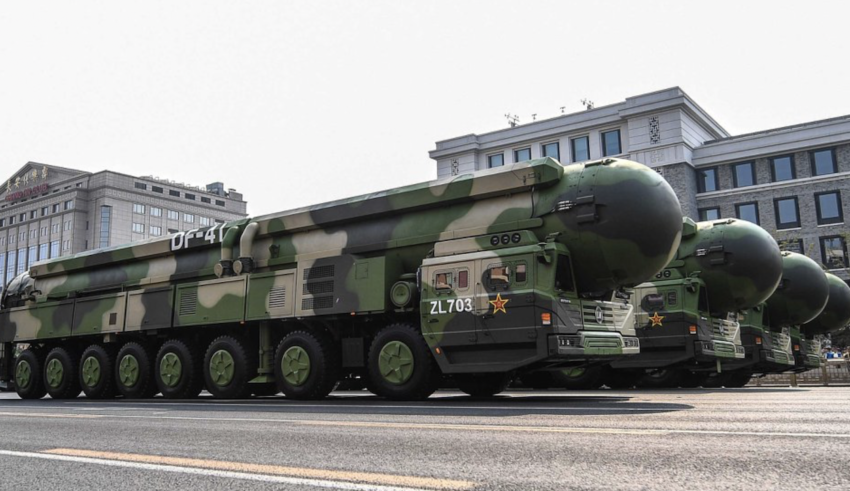
China expresses unwillingness to participate in nuclear arms control talks along with the United States and Russia, due to its relatively smaller nuclear arsenal. That’s why it tries to promote a bilateral approach between the U.S. and Russia regarding the nuclear disarmament procedure and at the same time it promises to consider its participation in the negotiations when the two adversaries reduce their arsenals approximately to China’s level. The U.S. is obviously frustrated by this very attitude and attempts either to succeed a possible China’s acculturation in the existing Russian-U.S. strategic new START treaty, or to establish a new trilateral nuclear arms control format.
Almost two years ago the U.S. invited China to join the strategic security dialogue, achieving thus the first step towards an international agreement among the three major powers. After China’s rejection for the aforementioned reason, another attempt was made by President Trump in 2020, in order to avoid the costly process of arms race, when again China made it clear that it’s not going to participate in a trilateral arms control negotiations, urging the U.S. and Russia to proceed in extension of the new START on their own.
(Reuters.com, 2020). (ECNC.cn., 2020). (Fmprc.gov.2019).
While China suggests the downgrade of the U.S. and Russian nuclear arsenals, it doesn’t specify the exact level of this decrease, nor makes it clear if it refers to strategic or all nuclear weapons. In the first case, Russia and the United States would have to decrease their nuclear arsenals by 65%-75% (from 1,550 deployed nuclear warheads which are currently active regarding the rules of the new START). Yet, if China’s approach includes the total number of nuclear warheads of each side, they have to shrink their arsenals by no less than 90%.
(Fact Sheet China, 2004). (Karber, 2011), (Kristensen and Korda, 2020).
China’s demand for achieving the “comparability” of nuclear potentials as a precondition for beginning a trilateral dialogue initiates from its evaluation of the consequences of its participation in the negotiations. This stance is neither absurb nor propagandistic, and rests upon major political, military and strategic cornerstones. Regarding the United States, it is not clear what are the reasons for attempting to ensure China’s participation. There may be several possible motives, such as searching for a way to obtain adequate information about the latest situation of China’s nuclear potential and future development plans, in order to adjust its own modernization programs accordingly. Another possible reason is that the United States may be unwilling to proceed with the nuclear disarmament policy and exploit China’s continuous refusal to take part in negotiations as an opportunity to accuse it for the malfunction of the procedure.
Why China doesn’t want to participate
By participating in the agreement, China will have to provide detailed information related to its nuclear weapons and deployment sites, along with the resignation of measures to conceal its nuclear forces, alter the location of missile systems and accept inspectors to visit classified facilities, so they identify that the proper actions have been taken and the provided details are correct. In addition, China will be obliged to inform other signatories of the acquisition of new nuclear weapons and the withdrawal of older ones. Consequently, China will be under total nuclear control.
Such containtments are against China’s official nuclear policy, making its nuclear arsenal completely vulnerable to a first nuclear strike, as a possible enemy who maintains a significant advantage in nuclear weapons and detailed information regarding the deployment sites, could easily destroy China’s nuclear potential. In such a scenario, the enemy would use more nuclear weapons, but the goal of retaining an attack potential would be succeeded and the victim wouldn’t be able to respond with a retaliatory strike. Keeping all this into consideration, China’s participation in nuclear arms control would be an action against its “no-first-use” policy and it would cost some of its credibility, losing the ability to apply this very policy in practice.
The U.S. pressure
To achieve an alteration to China’s approach, the U.S. may follow three types of persuasion: The first one is simply putting pressure on China in case it changes its attitude and joins conversations. The second one is incorporating lucrative proposals for China, and thus makes it sit in the table of negotiations. The third one accounts for the combination of the previous ones. From its part, Russia doesn’t really facilitate the initiative of the U.S., as it clearly has no intention to put pressure on China.
The existing proposals from military and political experts in persuading China to negotiate are -among others-:
- establishing transparency with mutual disclosure of information regarding the number of missiles and deployed warheads, details about the range, locations and deployment sites. Nevertheless, this proposal accounts for the least acceptable one among the participants.
(Tosaki, 2019).
- controlling the missile systems, for instance achieving a common ceiling for intermediate-range ground-based and air-launched missiles or a restriction on any strategic missiles of all types, as well as the intermediate-range missiles of China, the United States, and Russia. This approach may provide an approximately equal commonground for negotiations (Zhao, 2020).
The challenging part of these proposals is that they don’t take into consideration China’s nuclear policy, which is the key point of getting China in the table of negotiations.
Conclusion
Currently and in the near future, China seems unlikely to join the nuclear arms control negotiations, yet it is quite interesting to monitor its future decisions affected by the U.S. pressure. One of the major decisions to make is maintaining its “no-first-use” policy or abandoning it.
Theoretically, the issue of strategic nuclear forces’ vulnerability can be addressed by applying missile defenses around deployment sites, although this potential solution would be too costly and challenging to be introduced soon enough. In addition, the problem could be solved by establishing the “launch-under-attack” or “launch on warning” concept, requiring the development of an early warning system for satellites and radars, providing no guarantees that the system alone can confront the U.S. SLBMs, which have counterforce capability.
Keeping all that in mind we can argue that if China ultimately joins the treaty, it will have to abandon its current policy of “no-first-use” and accept the following consequences of such an action. In this case, an outburst of an enhanced arms race is highly possible, as China may attempt to adopt more aggressive nuclear arms concepts.
References
- Adamczyk, E., 2019, China Will Double Its Nuclear Warheads in Next 10 Years, DIA Chief Says, UPI-Defense News.
https://www.upi.com/Defense-News/2019/05/31/China-will-double-its-nuclear-warheads-in-next-10-years-DIA-chief-says/1621559319133/ - Fact Sheet China, 2004, Nuclear Disarmament and Reduction of. Ministry of Foreign Affairs of the People’s Republic of China, Fact Sheet China, 27 April.
https://nuke.fas.org/guide/china/doctrine/fs042704.pdf - Fan W. 2020, China Will Not Join So-Called China-U.S.-Russia Arms Control Negotiations, ECNC
http://www.ecns.cn/news/politics/2020-03-06/detail-ifzuhesu4122041.shtml - Ford C., 2020, US Priorities for “Next Generation Arms Control”. US Department of State, Arms Control and International Security Papers, vol. 1, no.1, pp. 4.
https://www.state.gov/wp-content/uploads/2020/06/T-paper-series-1-Arms-Control-Final-1-508.pdf - Fravel M., 2019, China Has Not (Yet) Changed Its Position on Nuclear Weapons. The Diplomat, 22 April.
https://thediplomat.com/2013/04/china-has-not-yet-changed-its-position-on-nuclear-weapons/ - Liangyu, 2019, China Pursues Nuclear Strategy of Self-Defense: White Paper. Xinhua, 24 July.
http://www.xinhuanet.com/english/2019-07/24/c_138253330.htm - Mehta A., 2020. Arms Control Decisions by Trump Administration Could Be ‘Imminent.’ Will China Be Involved?, Defense News, February 26.
https://www.defensenews.com/author/aaron-mehta/ - Refaat M., 2021 (June), Nuclear Deterrence in the 21th Century: An Obsolete Doctrine?, The European Institute for International Law & International Relations.
https://www.eiir.eu/strategic-affairs/nuclear-deterrence/nuclear-deterrence-in-the-21st-century-an-obsolete-doctrine/ - Riechmann, D., 2020, Trump Still Hoping for US-Russia-China Nuclear Arms Pact. The Star, 14 February.
https://www.thestar.com/news/world/us/2020/02/14/trump-still-hoping-for-us-russia-china-nuclear-arms-pact.html - Schneider, M. B., 2019, Nuclear Weapons in Chinese Military Strategy. National Institute for Public Policy. Information Series. Issue No. 441, May 3.
https://nipp.org/information_series/schneider-mark-nuclear-weapons-in-chinese-military-strategy-information-series-no-441/ - Tosaki, H., 2019, Nuclear Arms Control in a Post-INF Treaty Period: A Chance to Engage China?, The Japan Institute of International Affairs. JIIA Strategic Comments, No. 9,
https://www2.jiia.or.jp/en/article_page.php?id=18 - Zhao, T., 2020, Opportunities for Nuclear Arms Control Engagement with China. Arms Control Today.
https://www.armscontrol.org/act/2020-01/features/opportunities-nuclear-arms-control-engagement-china#bio
By: The European Institute for International Law and International Relations.












